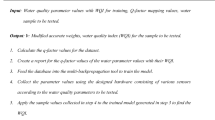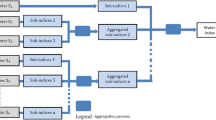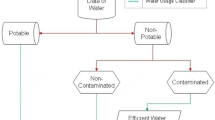Abstract
Improving drinking water source monitoring is crucial for efficiently managing the drinking water treatment process and ensuring the delivery of safe water. Data mining techniques could prove useful to help forecast source water quality. In this study, two approaches were used to forecast turbidity mean levels and peaks in the main drinking water source of the city of Québec, Canada. Trend analysis was applied for the prediction of significant turbidity events (>99th percentile of data distribution). Artificial neural networks using antecedent moisture conditions as input parameters (all turbidity peaks) served to forecast daily turbidity time series. Results show that trend analyses help anticipate the timing of turbidity peaks ― with differences between the cold season (fall and winter) and the warm season (spring and summer) and mean anticipations between 45 and 85 min and 25 and 45 min, respectively ― and the magnitude of the peak. The artificial neural network model was developed and proven capable of predicting the mean levels of turbidity at the drinking water intake of the investigated catchment. These early warning systems could be applied to source water system forecasting and provide a framework for adjusting drinking water treatment operations.






Similar content being viewed by others
References
APEL (Association pour la protection de l’environnement du lac Saint-Charles et des Marais du Nord) (2014) Suivi des rivières du bassin versant de la rivière Saint-Charles - Campagne 2013, Québec, Canada, 150 pp
Bača P (2008) Hysteresis effect in suspended sediment concentration in the Rybárik basin, Slovakia. Hydrol Sci J 53:224–235. https://doi.org/10.1623/hysj.53.1.224
Beaudeau P, Pascal M, Mouly D, Galey C, Thomas O (2011) Health risks associated with drinking water in a context of climate change in France: a review of surveillance requirements. J Water Clim Chang 2:230–246. https://doi.org/10.2166/wcc.2011.010
Davies-Colley RJ, Smith DG (2001) Turbidity, suspended sediment, and water clarity: a review. J Am Water Resour Assoc 37(5):1085–1101. https://doi.org/10.1111/j.1752-1688.2001.tb03624.x
Delpla I, Jung a-V, Baures E, Thomas O (2009) Impacts of climate change on surface water quality in relation to drinking water production. Environ Int 35:1225–1233. https://doi.org/10.1016/j.envint.2009.07.001
Environment Canada (2016) http://climate.weather.gc.ca/climate_normals/results_1981_2010_e.html?searchType=stnName&txtStationName=Quebec&searchMethod=contains&txtCentralLatMin=0&txtCentralLatSec=0&txtCentralLongMin=0&txtCentralLongSec=0&stnID=5251&dispBack=1. Accessed 17 Jan 2017
Fayyad U, Piatetsky-Shapiro G, Smyth P (1996) From data mining to knowledge discovery in databases. AI Mag 17(3):37–53
Fernández-Nóvoa D, Mendes R, Dias JM, Sánchez-Arcilla A, Gómez-Gesteira M (2015) Analysis of the influence of river discharge and wind on the Ebro turbid plume using MODIS-aqua and MODIS-Terra data. J Mar Syst 142:40–46
Gray J, Glysson G (2002) In: Proceedings of the federal interagency workshop on turbidity and other sediment surrogates, April 30–May 2, 2002, vol 1250. U.S. Geological Survey Circular, Reno
Iglesias C, Martínez Torres J, García Nieto PJ et al (2014) Turbidity prediction in a River Basin by using artificial neural networks: a case study in northern Spain. Water Resour Manag 28:319–331. https://doi.org/10.1007/s11269-013-0487-9
Jimenez Cisneros BE, Oki T, Arnell NW, Benito G, Cogley JG, Doll P et al (2014) Freshwater resources. In: Field CB, Barros VR, Dokken DJ, Mach KJ, Mastrandrea MD, Bilir TE, Chatterjee M, Ebi KL, Estrada YO, Genova RC, Girma B, Kissel ES, Levy AN, MacCracken S, Mastrandrea PR, White LL (eds) Climate change 2014: impacts, adaptation, and vulnerability. Part a: global and sectoral aspects. Contribution of working group II to the fifth assessment report of the intergovernmental panel on climate change. Cambridge University Press, Cambridge, pp 229–269
Kantardzic M (2011) Data mining: concepts, models, methods, and algorithms, 2nd edn. Wiley, New York ISBN 978-0-470-89045-5
Lana-Renault N, Regüés D (2009) Seasonal patterns of suspended sediment transport in an abandoned farmland catchment in the central Spanish Pyrenees. Earth Surf Process Landf 34:1291–1301. https://doi.org/10.1002/esp.1825
Maier HR, Morgan N, Chow CWK (2004) Use of artificial neural networks for predicting optimal alum doses and treated water quality parameters. Environ Model Softw 19:485–494. https://doi.org/10.1016/S1364-8152(03)00163-4
Mas DML, Ahlfeld DP (2007) Comparing artificial neural networks and regression models for predicting faecal coliform concentrations. Hydrol Sci J 52:713–731. https://doi.org/10.1623/hysj.52.4.713
Mather AL, Johnson RL (2015) Event-based prediction of stream turbidity using a combined cluster analysis and classification tree approach. J Hydrol 530:751–761. https://doi.org/10.1016/j.jhydrol.2015.10.032
MDDELCC (Ministère du Développement Durable et la Lutte contre les Changements Climatiques) (2016) Regulation on the quality of drinking water (Règlement Sur la qualité de l'eau potable). Government of Québec, Québec
Morris JK, Knocke WR (1984) Temperature effects on the use of metal-ion coagulants for water treatment. J Am Water Works Assoc 76(3):74–79
Mukundan R, Pierson DC, Schneiderman EM, O’Donnell DM, Pradhanang SM, Zion MS et al (2013) Factors affecting storm event turbidity in a New York City water supply stream. Catena 107:80–88. https://doi.org/10.1016/j.catena.2013.02.002
Palani S, Liong SY, Tkalich P (2008) An ANN application for water quality forecasting. Mar Pollut Bull 56:1586–1597. https://doi.org/10.1016/j.marpolbul.2008.05.021
Rodriguez MJ, Sérodes JB, Levallois P (2004) Behavior of trihalomethanes and haloacetic acids in a drinking water distribution system. Water Res 38(20):4367–4382
Seeger M, Errea MP, Beguería S, Arnáez J, Martı C, Garcıa-Ruiz JM (2004) Catchment soil moisture and rainfall characteristics as determinant factors for discharge/suspended sediment hysteretic loops in a small headwater catchment in the Spanish pyrenees. J Hydrol 288:299–311. https://doi.org/10.1016/j.jhydrol.2003.10.012
Singh KP, Basant A, Malik A, Jain G (2009) Artificial neural network modeling of the river water quality-a case study. Ecol Model 220:888–895. https://doi.org/10.1016/j.ecolmodel.2009.01.004
Tomperi J, Juuso E, Etelaniemi M, Leiviska K (2014) Drinking water quality monitoring using trend analysis. J Water Health 12:230–241. https://doi.org/10.2166/wh.2013.075
Tomperi J, Juuso E, Leiviskä K (2016) Early warning of changing drinking water quality by trend analysis. J Water Health 14:433–442. https://doi.org/10.2166/wh.2016.330
USEPA (United States Environmental Protection Agency) (1999) Guidance manual for compliance with the interim enhanced surface water treatment rule: turbidity provisions. U.S. Environmental Protection Agency, EPA 815-R-99-010
USEPA (2016) Table for regulated drinking water contaminants. https://www.epa.gov/ground-water-and-drinking-water/table-regulated-drinking-water-contaminants. Accessed 17 Jan 2017
WHO (World Health Organization) (2008) Guidelines for drinking-water quality: incorporating 1st and 2nd addenda. Vol. 1, recommendations, 3rd edn. World Health Organization, Geneva
Yang TM, Fan SK, Fan C, Hsu NS (2014) Establishment of turbidity forecasting model and early-warning system for source water turbidity management using back-propagation artificial neural network algorithm and probability analysis. Environ Monit Assess 186:4925–4934. https://doi.org/10.1007/s10661-014-3748-z
Acknowledgments
This study was supported by MITACS. We acknowledge Francois Proulx from the City of Québec for providing the rainfall data, and Christian Pelletier and Louis Collin for providing us access to turbidity data from the Québec DWTP.
Author information
Authors and Affiliations
Corresponding author
Ethics declarations
Conflict of Interest
The authors declare no conflict of interest. The founding sponsors had no role in the design of the study, in the collection, analyses, or interpretation of data, in the writing of the manuscript, and in the decision to publish the results.
Rights and permissions
About this article
Cite this article
Delpla, I., Florea, M. & Rodriguez, M.J. Drinking Water Source Monitoring Using Early Warning Systems Based on Data Mining Techniques. Water Resour Manage 33, 129–140 (2019). https://doi.org/10.1007/s11269-018-2092-4
Received:
Accepted:
Published:
Issue Date:
DOI: https://doi.org/10.1007/s11269-018-2092-4




